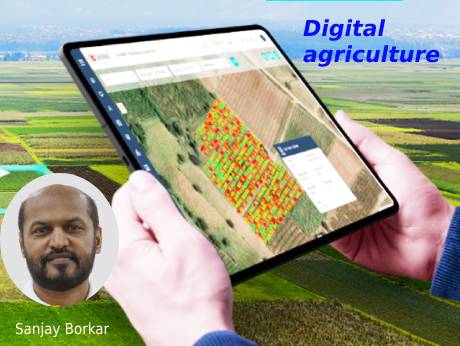
By Sanjay Borkar, CEO and Co-Founder of FarmERP
April 11 2022: In response to the rise in demand for food along with the growing population, a promising production revolution, “Precision Agriculture” has been making progress. Adaptation of technologies has enhanced the agri-value chain ensuring that the agri-industry is back on a sustainable track and the same has also been the key driving factor behind “Precision Agriculture”.
First of all, we need to understand what is precision farming?
Precision farming is a method of increasing average yields by using exact amounts of inputs in comparison to traditional farming approaches. The limited field size in India is a serious issue. More than 58 per cent of the country's operational properties are smaller than one hectare in size (ha)
Since production practices have significantly transformed over the years. Tools, machinery and technology, are the primary factors determining input to yield ratio. These usages have become extremely common due to their efficiency. This is not only because they help make a man’s job easy but also because today these tools and technologies are enabling upscaling and sustainable use of resources throughout the value chain, be it resource, time or even money.
According to UNEP, the world’s population is on track to reach 10 billion by 2050. Which naturally means it will cause a rise in demand for food. This along with the economic and environmental impact of catastrophic weather pushes the globe towards the adoption of ethical and sustainable farming practices.
Precision Farming or Agriculture puts data and digital tools to use in order to generate insights that further assist agri-stakeholders, farmers and enterprises to make better decisions that boost efficiency, productivity and sustainably. Digital technologies in precision farming allow the data to flow seamlessly and this further amplifies the overall outcome of farm and business operations.
Agricultural sensors are a key technology that is put to use in precision farming. These are arrayed across the new-age farming tools and crop monitoring systems in order to help provide critical data to farmers and enterprises. These sensors can effortlessly detect a wide range of metrics such as temperature, humidity, soil quality and so on, helping monitor the crop health and further form uniform decisions.
However, we also face a major data challenge. More than 58 per cent of the country's operational properties are smaller than one hectare in size (ha).
Why is this a problem??
While this data can be a great helping hand, the amount of data collected or as we call it the ‘Data Set’ needs to be comprehensive. Due to the small size of farms, there could often be gaps in the data collected.
We solve this using two pillars of new-age farming practices, Artificial Intelligence (AI) and Machine Learning (ML). AI and ML are used to compare, check and often detect possible errors. Moreover, by detecting errors it is also possible to rectify these errors by comparing them with data collected over time and graphing extracting relevant information.
Not only do these encourage smart and data-based farm decisions but they also enhance the productivity and sustainability of agricultural activities across the entire Agri value chain. They promote farmers and enterprises to extract information from the data that is collected by technologies and crunch it to build a framework to form intelligent predictions.
These have been a great helping hand when it comes to solving complex agricultural concerns such as pattern recognition, pest identification and so on.
Drones are helping agri-stakeholders evaluate crops across the entire farmland and also transfer real-time data to other connected equipment, helping farmers monitor their farms in an efficient way. Drones have also been used to spray fertilisers in sufficient quantity across the farmland, helping prevent the overuse or underuse of chemicals on crops.
New-age technologies have been a game-changer in precision farming. Robots for instance have successfully led to a betterment of operational-pace, without having to compromise on the quality of work that is done. These have been very helpful in automating repetitive and tedious tasks that would have taken hours and eventually might have even drained a farmer’s energy, influencing their overall productivity.
Precision Farming is becoming the norm. It is not only lessening the dependency on farm labour but is also expediting agricultural activities and eliminating the possibility of errors in the farming operations, making farming more value-driven and productive. These technologies are creating a route for farmers to smartly use their resources while driving greater value from their farming operations.